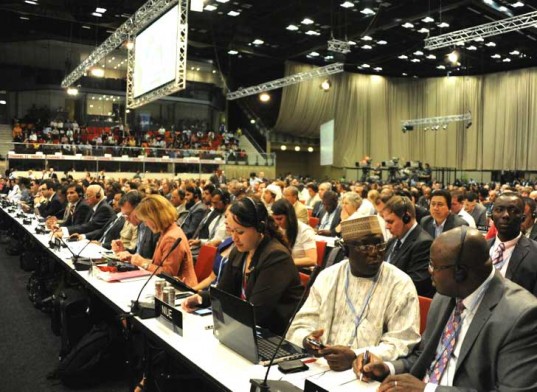Indaba
“Working Together, Saving Tomorrow Today.”
Motto of the COP-17 Climate Meeting at Durban
Man, there is a lot to consider as we plunge into this week.
Annook is in the Little Village by the Bay, and reports that Big Mama is settling into life without the peripatetic Raven. That is good news, and may have a direct impact on my life and travel plans. We will have to wait and see how her two-week visit goes.
The looming and slow-motion collapse is immediate and real, and requires action, I just don’t know what that is.
To a degree, the two titans of Europe, German Chancellor Angela Merkel and French President Nicolas Sarkozy are meeting so frequently to defuse the collapse of the Eurozone that wags have taken to calling them “Merkozy.” I care about that because I have pal in the Swedish market, and to a larger degree, the collapse of Europe will expose America- and thus the Socotra enterprise- to another rash of bank failures and economic disaster.
I wish Merkozy well. Failure of this beast-with-two-backs will have consequences closer than the middle distance, and I am watching with more than a little bit of angst.
This has all been unfortunate in terms of timing for the 17th Conference of the Parties, COP-17 in shorthand, longer as the 2011 United Nations Climate Change Conference, or for purposes of location, the Indaba. Saving the planet has suffered from some inconvenient coincidences.
Remember the imposing and unusual snowdrifts at the conference on warming in Copenhagen in 2009? Or the record cold that chilled the Cancun conclave in 2010?
Before anyone starts hurling things in this direction, and just for the record, Big Oil has been noticeably absent in supporting Socotra House Publications, and I am no “denier,” a curious term that puts skeptics of current climate science in the same class as Iranian President Mahmoud Ahmadinejad speaking of the Holocaust.
Of course, I am no scientist, but I try to stay current on the intense political debate in progress based on the results of settled science.
Which of course it isn’t. That is revealed in the WikiLeaks-style release of internal e-mails from the central server of the Climate Research Unit of the University of East Anglia. The CRU is the hub for progressive climate science. The discourse reveals the uncertainty even within the true believer community.
Even the most devoted members of The Team acknowledge among themselves that there are real problems with the most emblematic examples of rapid warming caused by the inexorable rise of carbon dioxide in the atmosphere- the famous Hockey Stick graphic produced by Michael Mann of Penn State University.
Don’t rush too swiftly to lump me in with the crazies. I am confident that Climate Change is real. That is what it does, after all, and change is the natural state of this spinning marble with the oceans sloshing around like a colossal bathtub.
The mean temperature of the Earth’s surface has increased by 0.5 to 0.6ºC since 1880. I am more than happy to accept that Anthropomorphic Global Warming is also real to some degree, even if we should investigate why temperatures have not increased to any measureable degree since the late 1990s, while the concentrations of CO2 has continued to increase.
There is clearly something else going on that the scientific method has not yet revealed. The Himalayan Glacier crisis and rising sea level and acid content are much discussed at this Indaba, since the temperature rise is not selling as well as it could.
I get the line of reasoning. If bad things are happening, r about to happen, we need to take action. But about what? I have heard a lot of angst about the increase of severe weather linked to climate change. At the same time, we are in a hundred-year low on tropical storms impacting the US mainland.
The relationship is not clear, and there are those who allege there is not and never has been any real danger of catastrophe or even of serious net detriment to human life due to increased CO2 levels. Indeed, modest increases in these parameters are most likely a net benefit to agriculture.
No matter. The science advocates have convinced the political, media and public establishments that something- something big- needs to be done immediately.
I am happy to reduce my carbon footprint, and none of us are going to have much choice about that, since the price of energy is going to skyrocket anyway. “Green” energy, which in my mind includes the reviled Nuclear industry, is not going to provide any near-term relief.
Clean coal isn’t, though it can get better, wind does not blow on demand, Biomass has problems, and solar does not work so well when the sun is down. Not that every technology shouldn’t be pursued. But maybe it shouldn’t be bankrolled willy-nilly by the government.
The whole cap-and-trade argument is a bonanza for the political classes, or at least it was before the bottom fell out of it all around the world.
Anyway, one of the big deals at Indaba is the issue of fairness. The argument- really quite rational- is that if the First World has contributed unjustly to altering the climate, they ought to pay for it. Accordingly, the second and third worlds are looking for subsidies of a $100 billion a year to help ameliorate the impact of Climate Change.
Considering we are all a little short these days, that is going to be a hard sell. Not that some world leaders are not doing their darnedest to showcase the impact of rising seas:
No one makes this point better than Mohamed Nasheed, President of the Maldives, the Indian Ocean island nation. In the run-up to the summit, he declared that he leads “an island nation that may slip beneath the waves if all this talk on climate does not lead to action soon”.
Since chairing a meeting of his Cabinet underwater, Nasheed has been busy rallying other low-lying countries to make similar points.
Remember: “It is unfair to ask the poorest and most vulnerable to bear the brunt of the impact of climate change alon.” That is the position of UN General Secretary Ban Ki-moon.
Right on. But there is a problem. One of the best scientists in the business- a fellow named Nils-Axel Mörner- who has been looking at sea level issues for 45 years. He asserts that there has been no rise in the seas for the last half century, and a general equilibrium for the last three hundred.
He is a smart guy, whether you like him or not, and I think we ought to look at his evidence. It is a lot cheaper than a trillion bucks.
Indaba is a Zulu word that means “a gathering of wise people, bearing the spirit of Ubuntu.” The translation of that last word I like best is “I am what I am because of who we are.” That is a universalist version of the great French natural philosopher Rene Descarte’s “Cognito ergo sum.”
“I think, therefore I am.” I think we need to think a little more on this, at least before I want to get out my wallet and hand money over to the United Nations.
Just a thought. Of course, the prospect of economic disaster by our own hands- like maybe this week or next- in what you might call Anthropomorphic Financial Catastrophe (AFC) will make it highly unlikely that anyone is going to succeed in extorting a trillion dollars out of the First World.
Not that it might not be a good idea. But we should think about it, right?
 (Delegates to the Indaba confer in Durban. Photo AP.)
(Delegates to the Indaba confer in Durban. Photo AP.)
Copyright 2011 Vic Socotra
www.vicsocotra.com

